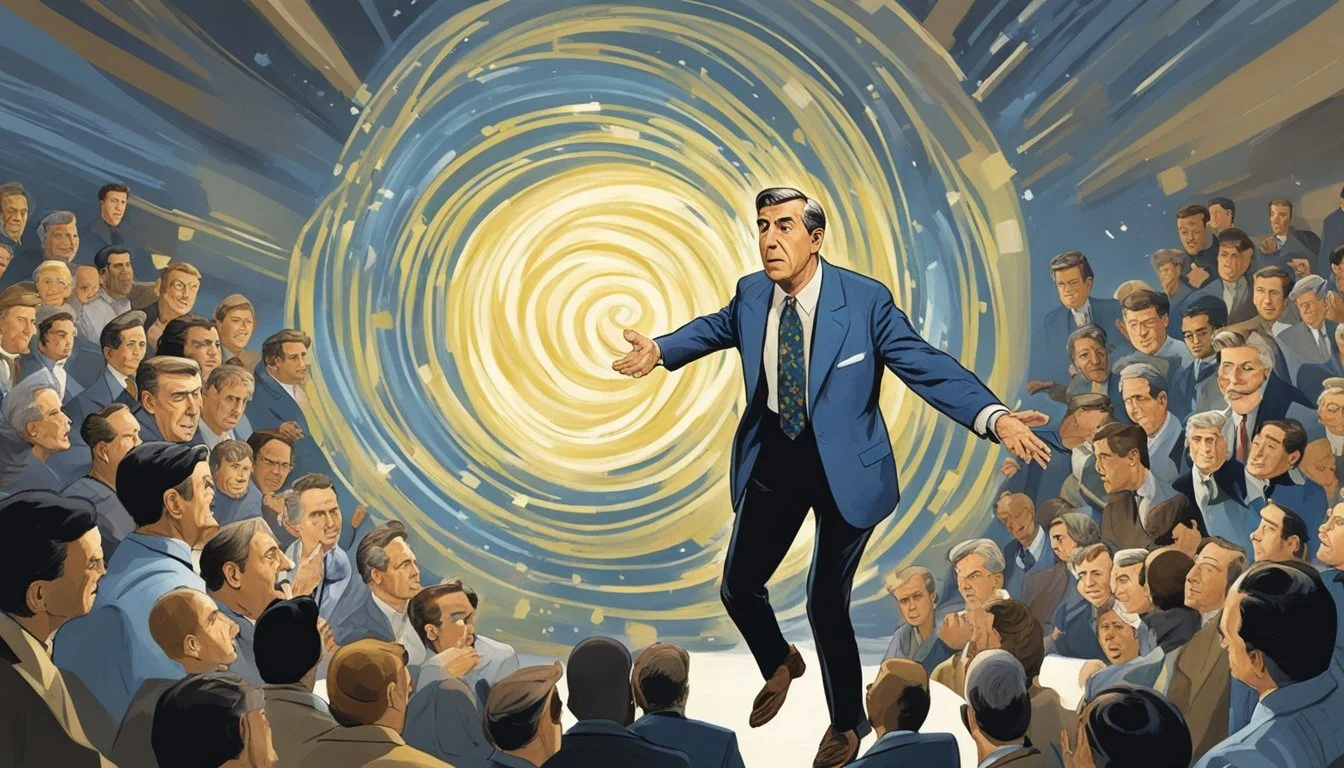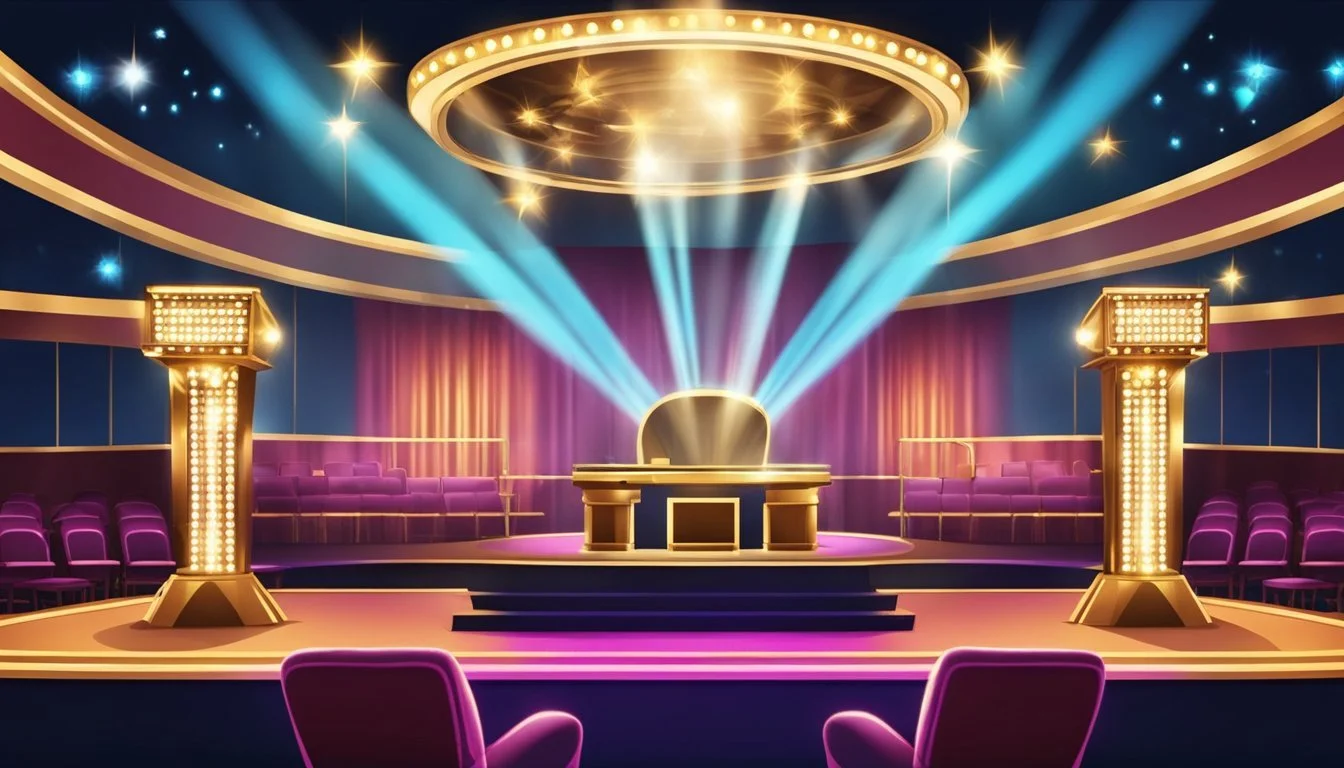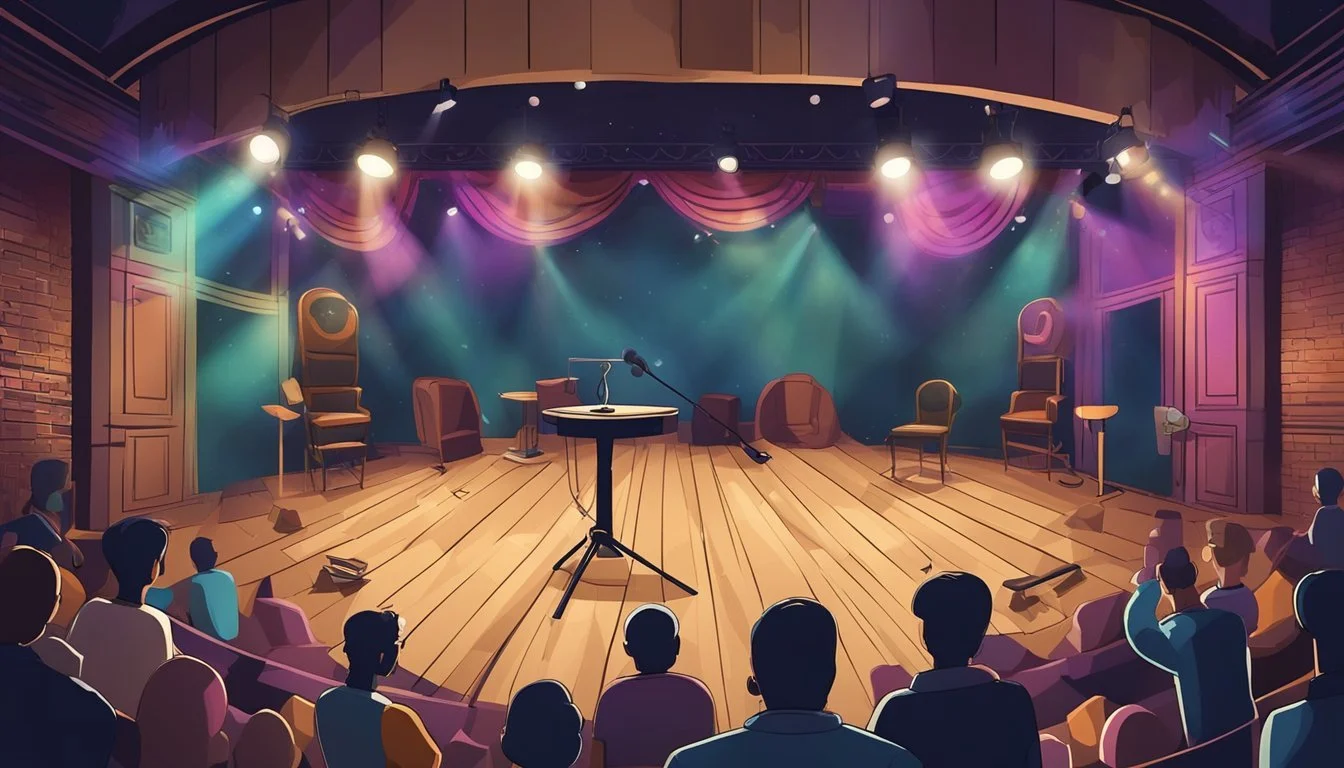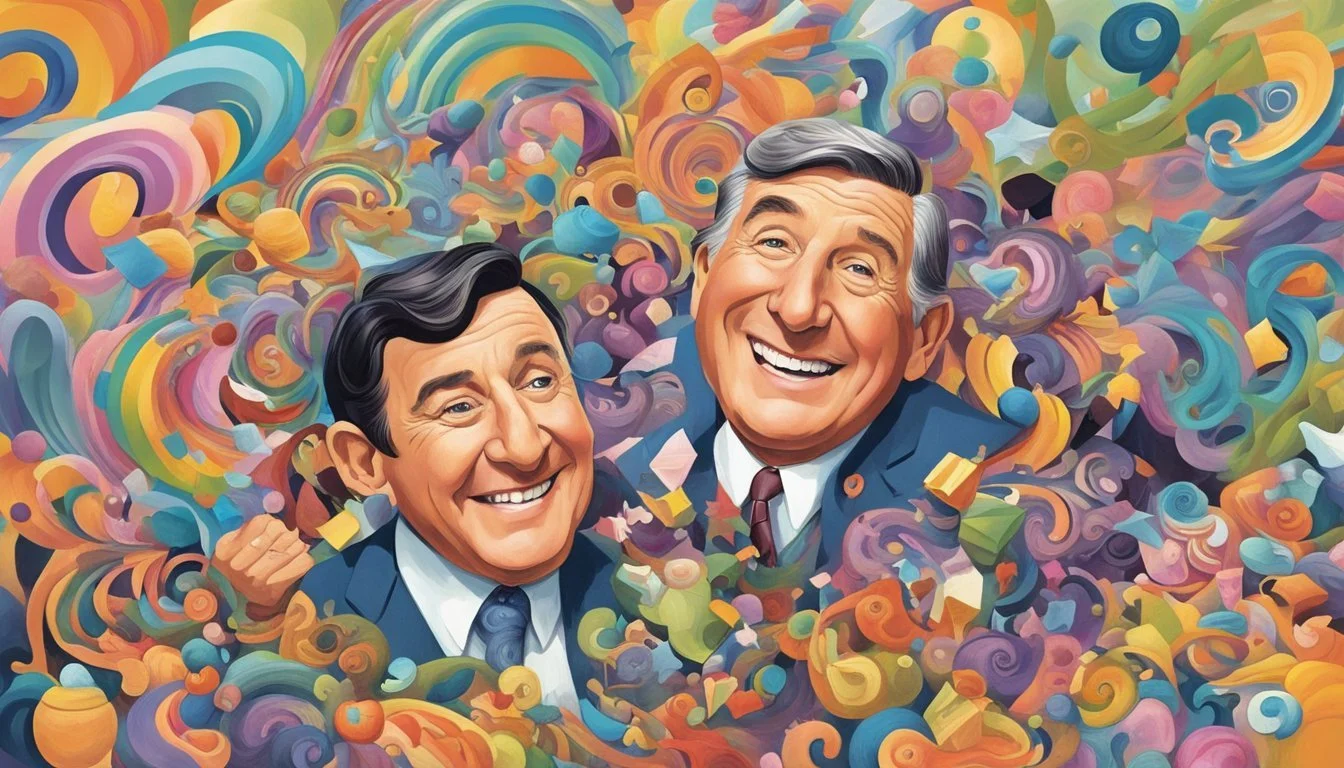Comedy and Crisis: Shecky Greene's Battle with Bipolar Disorder and Panic Attacks
A Comedian's Mental Health Journey
Shecky Greene, a comedic legend known for his high-energy performances in Las Vegas, passed away on December 31, 2023, at the age of 97. Behind his uproarious routines and sharp wit lay a personal struggle that shaped his career and life.
Greene battled severe mental health issues, including bipolar disorder and panic attacks, which significantly impacted his professional and personal life. These challenges often manifested in erratic behavior, leading to both amusing anecdotes and serious consequences for the comedian.
Despite his inner turmoil, Greene's talent shone through, earning him a reputation as a "comedian's comedian" among his peers. His ability to captivate audiences with his rambling, off-the-cuff style made him a staple of Las Vegas entertainment and a frequent guest on late-night television shows.
The Origin of Shecky Greene
Shecky Greene's journey from a young Fred Sheldon Greenfield to a comedy legend began in Chicago. His transformation from an aspiring gym teacher to a renowned entertainer shaped his unique comedic style.
Early Life and Education
Fred Sheldon Greenfield was born on April 8, 1926, in Chicago, Illinois. He grew up in a Jewish family on the city's North Side. As a child, Greenfield attended Sullivan High School, where he developed an interest in physical education.
Initially, he aspired to become a gym teacher. This early career goal would later influence his energetic performance style on stage.
Fred Sheldon Greenfield to Shecky Greene
After high school, Greenfield's path took an unexpected turn. He discovered his talent for making people laugh and decided to pursue a career in comedy.
He adopted the stage name Shecky Greene, a moniker that would become synonymous with high-energy, improvisational comedy. The name change marked the beginning of his transformation into the entertainer audiences would come to love.
Greene honed his skills in small clubs and venues around Chicago before making his way to Las Vegas. There, he would cement his status as a comedy icon.
Rise to Fame in Comedy
Shecky Greene's ascent in the comedy world was marked by his energetic performances and quick-witted humor. His journey took him from small nightclubs to national television and even film appearances.
Stand-Up Beginnings and Nightclubs
Greene's comedy career began in the 1950s, with his professional debut in 1954. He quickly gained a reputation for his fast-talking, narrative style of comedy that resonated with audiences. Nightclubs became his training ground, particularly in Las Vegas, where he honed his craft and developed his signature rapid-fire delivery.
His performances often included improvised material and audience interaction, setting him apart from other comedians of the era. Greene's ability to think on his feet and generate laughs in real-time made him a sought-after act in comedy clubs across the country.
Breakthrough on Television Shows
Television provided Greene with a platform to reach a wider audience. He became a regular guest on popular variety shows of the 1960s and 1970s. "The Ed Sullivan Show" and "The Tonight Show Starring Johnny Carson" frequently featured Greene's comedic talents.
His appearances on these programs showcased his unique style to millions of viewers. Greene's quick wit and ability to adapt to the television format helped him become a household name. His frequent guest spots on "The Tonight Show" cemented his status as a top-tier comedian of his time.
Film Appearances and Notable Work
Greene's success in stand-up and television led to opportunities in film. He appeared in several movies, including "History of the World, Part I" directed by Mel Brooks. This 1981 comedy allowed Greene to display his comedic timing on the big screen.
He also had roles in "The Love Machine" and made guest appearances on popular TV series like "The Love Boat." These performances demonstrated Greene's versatility as a performer, adapting his comedic style to different mediums and formats.
Greene's work in film and television complemented his stand-up career, expanding his reach and solidifying his place in the entertainment industry.
Shecky Greene and Las Vegas
Shecky Greene's career became synonymous with Las Vegas entertainment. His high-energy performances and quick wit made him a staple of the city's vibrant nightlife scene for decades.
Iconic Vegas Lounge Acts
Greene emerged as one of Las Vegas's premier lounge performers in the 1950s and 1960s. His unpredictable, off-the-cuff style captivated audiences at top venues like the Tropicana Hotel and MGM Grand. Greene's acts often ran for hours, blending prepared material with improvised jokes tailored to each crowd.
His ability to work a room and interact with audiences set him apart from other comics. Greene's performances became must-see events for tourists and locals alike. He shared stages with fellow Vegas legends like Frank Sinatra and Dean Martin, cementing his status as a cornerstone of the city's entertainment landscape.
Relationship with Casinos and Entertainment Industry
Greene's relationship with Las Vegas casinos was complex. His talent made him a valuable draw, but his unpredictable behavior sometimes caused friction. He famously claimed he "should have been fired maybe 150 times in Las Vegas."
Despite occasional conflicts, Greene remained a sought-after performer. Casinos like the Desert Inn recognized his ability to fill showrooms and keep patrons entertained. His long-running shows contributed significantly to Las Vegas's reputation as an entertainment capital.
Greene's influence extended beyond his own acts. He mentored younger performers and helped shape the evolving Las Vegas entertainment scene. His legacy as a quintessential Vegas showman endures, even as the city's entertainment offerings have changed over time.
Personal Struggles and Health
Shecky Greene's comedy career was marked by significant personal challenges. His battles with mental illness, substance abuse, and addiction impacted both his professional and private life.
Dealing with Bipolar Disorder
Greene struggled with bipolar disorder throughout his life. This condition caused severe mood swings, alternating between manic highs and depressive lows. During manic episodes, he often displayed excessive energy and impulsive behavior. Depressive periods left him struggling to perform or even leave his hotel room.
The comedian's erratic moods affected his relationships and work commitments. Greene sometimes cancelled shows at the last minute due to his mental state. His unpredictable behavior became legendary in Las Vegas, where he was known for both brilliant performances and public outbursts.
The Impact of Panic Attacks and Anxiety
Panic attacks severely disrupted Greene's life and career. These intense episodes of fear and physical symptoms often struck without warning. At times, Greene became so paralyzed by anxiety that he was unable to go on stage.
The comedian described feeling trapped by his own mind. He would experience racing thoughts, sweating, and difficulty breathing before performances. These symptoms sometimes forced him to flee venues moments before he was due to perform.
Greene's struggle with anxiety limited his ability to travel and take on new opportunities. He often relied on medication to manage his symptoms and continue working.
Battles with Alcoholism and Drug Abuse
Alcohol and drugs became Greene's coping mechanisms for his mental health issues. He turned to substances to calm his nerves before shows and manage his mood swings. This led to a destructive cycle of addiction.
Greene's drinking often spiraled out of control, leading to erratic behavior and public incidents. He was known for starting fights and making scene in casinos. His substance abuse issues contributed to the breakdown of his marriages and strained professional relationships.
The comedian also struggled with prescription drug abuse. He became dependent on various medications used to treat his anxiety and bipolar disorder.
Gambling: The Compulsive Habit
Compulsive gambling was another demon Greene battled. Las Vegas provided endless temptation, and he often lost large sums of money at the casino tables. His gambling addiction intertwined with his other struggles, creating a perfect storm of destructive behavior.
Greene's compulsive betting led to financial troubles and legal issues. He accumulated significant debts and faced lawsuits from casinos. The stress of his gambling losses exacerbated his mental health problems and substance abuse.
Despite periods of recovery, Greene found it difficult to stay away from the allure of gambling. This addiction remained a lifelong struggle, impacting his personal relationships and financial stability.
Cultural Impact and Legacy
Shecky Greene's unique comedic style and personal struggles left an indelible mark on the entertainment industry. His influence extended beyond the stage, shaping the landscape of comedy and television for decades.
Influence on Comedians and Television
Greene's rapid-fire delivery and improvisational skills inspired countless comedians. His ability to read audiences and adapt on the fly became a hallmark of stand-up comedy. Many performers, including Jerry Seinfeld and Jay Leno, have cited Greene as a major influence on their careers.
Greene's frequent appearances on late-night talk shows helped popularize the format of comedians as guests. His wit and unpredictability made him a favorite of hosts like Johnny Carson and Merv Griffin. This paved the way for future generations of comedians to use television as a platform for their craft.
Shecky Greene's Enduring Legacy
Greene's openness about his struggles with bipolar disorder and panic attacks helped destigmatize mental health issues in the entertainment industry. His candor encouraged other performers to speak out about their own challenges.
The National Comedy Hall of Fame recognized Greene's contributions to the art form. His performances in Las Vegas nightclubs set a new standard for residency shows, influencing how casinos approached entertainment.
Greene's ability to blend observational humor with self-deprecating jokes created a template for modern stand-up. His legacy lives on through the countless comedians who have adopted elements of his style and approach to comedy.
Personal Life and Relationships
Shecky Greene's personal life was marked by significant relationships and friendships in the entertainment world. His marriage to Marie Musso and connections with celebrities like Frank Sinatra shaped his experiences off-stage.
Shecky Greene and Marie Musso
Shecky Greene married Marie Musso in 1956. Marie was the daughter of renowned saxophonist Vido Musso, who played with Benny Goodman's orchestra. Their union lasted for 25 years before ending in divorce in 1981.
The couple faced challenges during their marriage, including Greene's struggles with bipolar disorder and panic attacks. Despite these difficulties, Marie supported Greene through his career ups and downs.
Friendship with Frank Sinatra and Other Celebrities
Greene formed close bonds with several entertainment industry figures, most notably Frank Sinatra. Their friendship began in Las Vegas during the 1950s and lasted for decades.
Sinatra appreciated Greene's comedic talent and often invited him to perform at his events. Greene also developed friendships with other celebrities, including Martha Raye. These connections provided both personal support and professional opportunities throughout his career.
Greene's relationships with fellow entertainers helped him navigate the competitive Las Vegas entertainment scene and provided a support network during his personal struggles.
The Intersection of Comedy and Crisis
Shecky Greene's career exemplified the complex relationship between comedy and mental health struggles. His experiences highlighted how performers often use humor to navigate personal challenges while battling internal turmoil.
Stage Fright and Performance Anxiety
Greene's battle with stage fright and panic attacks significantly impacted his comedy career. Despite his outward confidence, he often experienced intense anxiety before performances. This led to erratic behavior and occasional last-minute cancellations.
Greene developed coping mechanisms to manage his symptoms. He would pace backstage, practice deep breathing exercises, and sometimes rely on alcohol to calm his nerves. These struggles influenced his comedic style, contributing to his frenetic energy on stage.
His experiences shed light on the pressures faced by many comedians. The need to consistently deliver laughs while dealing with personal demons created a unique strain for Greene and his contemporaries.
Humor as a Coping Mechanism
Greene frequently incorporated his mental health struggles into his comedy routines. He used self-deprecating humor to address his bipolar disorder and panic attacks. This approach served multiple purposes:
It provided a cathartic outlet for his personal challenges
It helped destigmatize mental health issues for his audience
It allowed him to connect with others facing similar struggles
By turning his pain into punchlines, Greene found a way to process his experiences. His ability to find humor in dark moments resonated with many fans. This integration of personal struggles into his act became a hallmark of his comedic style.
The Role of Show Business in Personal Hardship
The entertainment industry's unique pressures and environments significantly impacted Shecky Greene's mental health struggles. His experiences in mob-controlled venues and the constant public scrutiny shaped his battle with bipolar disorder and panic attacks.
Working in Mob-Run Nightclubs
Shecky Greene's career often led him to perform in nightclubs with ties to organized crime. These venues presented a volatile atmosphere that heightened his anxiety. The constant threat of violence and unpredictable patrons created a tense working environment.
Greene had to navigate delicate relationships with mob figures while maintaining his comedic persona. This balancing act added substantial stress to his already fragile mental state.
The late-night hours and smoky atmospheres of these clubs also took a physical toll, potentially exacerbating his mental health issues.
The Pressure of Public Life
As Greene's fame grew, so did the expectations placed upon him. The demands of consistent performances and the need to always be "on" strained his emotional resources.
Stage fright became a significant challenge for Greene, despite his outward confidence. His panic attacks often peaked just before going on stage, forcing him to develop coping mechanisms to continue performing.
The public's perception of Greene as a carefree comedian conflicted with his internal struggles. This disconnect between his public persona and private battles intensified his feelings of isolation and anxiety.
Media scrutiny and the pressure to maintain his career success further complicated Greene's efforts to manage his bipolar disorder.
Shecky Greene's Passions Beyond Comedy
Shecky Greene's interests extended far beyond the comedy stage. He cultivated a deep love for thoroughbred horse racing and devoted time to charitable causes.
Interest in Thoroughbred Racing
Greene's enthusiasm for thoroughbred racing was well-known in entertainment circles. He frequently attended races at major tracks across the country, including the prestigious Kentucky Derby. The comedian developed a keen eye for horseflesh and often shared his insights with fellow racing enthusiasts.
Greene's fascination with the sport peaked during the 1970s, coinciding with the legendary career of Secretariat. He was present at several of Secretariat's races, marveling at the Triple Crown winner's record-breaking performances.
His involvement in thoroughbred racing went beyond spectating. Greene occasionally invested in racehorses, experiencing both the thrills and challenges of ownership in the competitive world of horse racing.
Charitable Endeavors and Public Service
Greene used his celebrity status to support various charitable causes. He participated in numerous benefit shows, raising funds for organizations focused on children's welfare and medical research.
The comedian's commitment to public service extended to supporting military veterans. Greene performed for troops overseas and at veterans' hospitals, bringing laughter to those who served.
He also lent his name and time to campaigns promoting mental health awareness, drawing from his personal experiences with bipolar disorder and panic attacks. Greene's openness about his struggles helped reduce stigma surrounding mental health issues in the entertainment industry.







